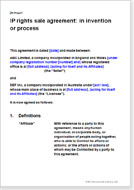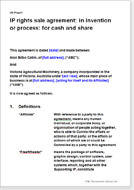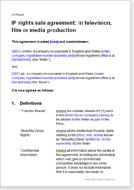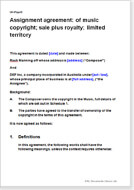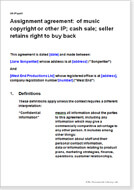Intellectual property assignment agreements
These assignment agreements are for the transfer of rights in software, copyright or other intellectual property. Use them where you want an outright sale rather than a licence.
IP rights sale agreement: in invention or process
This is a comprehensive agreement for the outright sale of limited rights in a piece of intellectual property such as an invention or software.
The nature of the product is not important to the document. It could be a stand-alone physical device, a component for another product, or something that improves an existing product.
The buyer purchases the all of the rights he needs so that he can use the IP as required.
The document covers:
- all intellectual property rights in every aspect of the work, for example: designs, copyright, software and patents
- derived products
- optional support by the licensor – with a separate licence to use any support systems
- the sub-license of third party IP rights
- third party infringement and mutual legal protection
This document might be used, for example:
- to sell a computer game to a game publisher. The publisher buys the rights to the story and characters behind the game so that he can market the game as his own, but the developer keeps back the rights to the code that allow those characters to move on-screen in a certain way so that he can use that code in a future game.
- a engineering firm sells a navigation system to a defence systems supplier, but retains the rights regarding the finishing process of a particular component.
IP rights sale agreement: in invention or process: for cash and shares
This document is a comprehensive legal framework for the sale of rights in intellectual property.
The IP being sold could be anything. It could be a complete product, a component of or add-on to another product, software, or something else.
The buyer purchases rights (rather than just licensing them) so that he can market the IP under his own brand and so that he doesn’t have to worry about licence restrictions when he sells the product on.
However, the rights sold can be limited by the seller. So the seller can retain the right to use the IP in another application, or in another market.
The sale may be cash only, or cash and shares in the buyer’s company.
The document covers:
- an option for the seller to license additional IP to the buyer (for example, supporting software, patents and trademarks)
- derived products
- continuing research, product improvement and updates
The document might be used, for example:
- To sell a type of camera casing developed by a company that specialises in underwater leisure products to an aeronautical company for use in high altitude aeroplanes.
- To sell web-based vehicle tracking software to a logistics software developer for incorporation within their software packages sold in Europe and North America.
IP rights sale agreement: in television, film or media production
This agreement is for the sale of rights in a work of an audio-visual nature. The buyer obtains full ownership and control so that he can use and market the work as his own.
The work could be of any size, complexity and of any type (i.e. at any stage of production).
For example, you might be selling rights in
- a script, or a book that could be converted to a script
- a training manual
- an advertisement
- a documentary programme or series to be broadcast on radio, television or online
- a programme consisting in a "reality" procedure rather than a written drama
The agreement preserves the author’s or originator’s rights to sell the same material in different markets by limiting the extent of the rights sold in this deal. You can restrict what you are selling by reference to use, publication, time, country, language, medium, or as you decide. The document preserves moral rights as author.
Either party can buy this agreement and successfully edit it for a deal that suits them.
By default:
- the document favours neither party – either could edit for their terms
- payment is part cash and part shares in the buyer company – it can be edited easily for a cash deal
It is assumed that your deal will complete on the signing of this agreement as a precise and firm arrangement. However, you could also complete at a specified later date, by when the buyer will have completed arrangements for authorisation.
Assignment agreement: of music copyright; sale plus royalty; limited territory
This is a straightforward sale of rights in music for cash with a continuing royalty. The royalty may be paid on the events you choose, such as recording, resale or performance.
The rights sold may be limited in whatever way you would like. For example, you may sell the composition only for use in a stage play or film, or for use only in live performances. The composer’s or originator’s moral rights are preserved.
There is the option for the composer also to be given a right of first refusal to buy the rights back if the buyer decides to sell in the future.
Assignment agreement: of music copyright or other IP; cash sale; seller retains right to buy back
This is a short assignment agreement for a straightforward sale of rights in music or other intellectual property for cash.
The seller retains a right of first refusal (a pre-emption right) to repurchase the IP if the buyer ever decides to sell.
The document has been drawn as a sale so that the buyer has freedom to use the IP without the restrictions of licence terms. However, provision has also been made for the seller to retain some rights so that he or she can further exploit or sell those. The retained rights could be any. For example, the IP might be a song (music and lyrics), with the sale limited to a particular geographic area (allowing the seller to sell the music again to someone who will add lyrics in a different language).
If the rights you wish to retain are complicated, we suggest that a licence agreement might be more appropriate.
The document protects the interest of the seller without offending or prejudicing the buyer. Although simple, it is as legally strong as documents drawn for more complicated deals.

If the document isn’t right for your circumstances for any reason, just tell us and we’ll refund you in full immediately.

We avoid legal terminology unless necessary. Plain English makes our documents easy to understand, easy to edit and more likely to be accepted.

You don’t need legal knowledge to use our documents. We explain what to edit and how in the guidance notes included at the end of the document.

Email us with questions about editing your document. Use our Lawyer Assist service if you’d like our legal team to check your document will do as you intend.

Our documents comply with the latest relevant law. Our lawyers regularly review how new law affects each document in our library.
Sell or transfer rights in any type of intellectual property
The documents on this page transfer your rights in intellectual property that you have created or otherwise own, to someone else. In legal jargon, these documents assign your rights. In everyday language, they deal with a sale.
The legal framework for a sale of rights is largely the same regardless of the type of IP being sold. A sale in a composition of music is not dissimilar from the transaction for the sale of a complex technological innovation.
These documents can be used to sell: a set of photos, a book, know how, a film script, architectural drawings, chemical formulae, film rights, trade marks, web page articles, a patent, or anything else.
The law does not restrict what sale terms you can agree. For that reason, we have been able to give you a very wide range of alternative deals and arrangements.
For example, payment might be cash up front, by royalty, by shares in the acquiring company or any combination.
It follows that when you look for the right document for your sale, look at the terms of the deal as well as the subject matter we have named in the title. If you need help, please ask us.
Who should use these documents?
Either the buyer or the seller could use these documents. They are written to be fair to both sides because even though the transfer is immediate, the buyer may still rely on the seller for co-operation with ongoing support.
Our guidance notes explain each paragraph so that editing a document is easy whether or not you regularly sell IP.
Strong legal documents
Where we refer to a document as 'simple' we mean it is uncluttered by supplementary arrangements – not that the legal effect is in any way compromised.
In contrast, a document described as 'heavyweight' contains many more options. You may or may not use all the options we give but by providing them, we hope to give you more ideas for consideration. You can easily delete the ones that are not applicable to your deal.
Limiting the rights sold
All these documents give you the flexibility to sell the legal title in IP rights subject to conditions on use by the buyer.
For example, you could sell rights to a design for a component, but limit the buyer to use that component only in certain products.
Selling limited rights allows you to maximise the value the IP because you can sell the rights multiple times to different buyers for different uses.
The other reason you might want to limit the rights sold in certain cases is because your IP contains the intellectual property under licence from someone else, and that you don’t have a licence to sell it.
What our documents cover
So far as applicable, our documents cover:
Fictitious names for people and products
We give fictitious names to the parties in the contract and the IP so that it is easier for you to follow the document. Of course, you will need to change these to the names of your own parties or products, or use generic ones.
Complete legal and commercial framework
Every agreement comprehensively provides the terms you need for a deal. We cannot mention every detail of every document here, but you can be confident that if you are likely to need a term, we include it.
Support by the owner or creator to the licensee
Many deals involve not only a sale, but also a licence of secondary IP that supports the primary IP sold. For example, you might sell a physical product that requires software to operate. Updates to the software would be licensed rather than sold with the hardware.
The reasons why you might want to licence some IP rights rather than sell all are the same as why you might want to limit the rights sold: you may want to retain control to maximise the value you receive; or you may not have the rights yourself to sell.
We provide in many of our documents for an additional licence to complement the sale. If not needed, these terms can easily be deleted.
Preserving moral rights
Although a creator automatically by law has the right to be recognised, we do nonetheless mention it in many agreements.
All rights reserved

